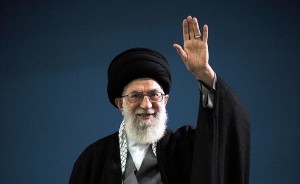 In his latest declaration of Irans strength, the Supreme Leader has said the Islamic Republics industrial might will make the worlds bullying powers respect it.
In his latest declaration of Irans strength, the Supreme Leader has said the Islamic Republics industrial might will make the worlds bullying powers respect it.Addressing workers of the MAPNA machinery complex in Alborz Province in northern Iran, Ayatollah Khamenei said, (If) we stand on our own feet and be strong, they have to respond respectfully and reasonably.
Ayatollah Khamenei continued, We should grow from within (Iran), but we should be active and influential in global markets.
The Supreme Leader linked his economic message to high-level nuclear talks with the 5+1 Powers, which resume on May 7 in Vienna he insisted that the capability to enrich uranium up to 20% is a demonstration of the countrys national determination.
Iran suspended production of 20% uranium under Novembers interim nuclear deal, and it diluted stock to 5% or converted it to oxide powder. However, it is insisting that it be allowed to enrich uranium to 5% in any final arrangement.
Ayatollah Khamenei insisted, The more we make progress in every field, the more the other side will understand the futility of its sanctions.
Iranians in Exile Question Rouhani Assurances of Safety if They Return
Questions are piling up over President Rouhanis assurance, given last September in New York, that Iranians forced into exile can now return home.
Amid stories of hours of interrogation of those who take up the offer, journalist Hossein Nouraninejad was arrested on April 21, a month after he returned from Australia to resume life with his wife and infant son.
Nouraninejads wife, Parastou Sarmadi, said her husband was transferred to a section of Evin prison that is controlled by the intelligence branch of the Revolutionary Guards.
Authorities have not given a reason for the arrest.
Two other activists said they had been advised by Intelligence Ministry and judiciary officials, through the activists relatives, to stay where they are.
Iran Prosecutor General Gholam Hossein Mohseni Ejei effectively pushed aside Rouhanis words last week, saying that anyone connected with sedition the regimes term for mass protests after the disputed 2009 Presidential election would be arrested on entry into Iran.
By EA WorldView
The Iran Project is not responsible for the content of quoted articles.










